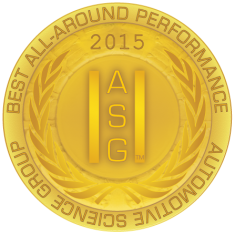New Study By The Automotive Science Group Finds Best Truck Of 2015
Industry: Transportation & Logistics
2015 Ford F-150 Aluminum Design Delivers Best Life-cycle Performance
Santa Rosa, California (PRUnderground) January 13th, 2015
With a myriad of eco-branded trucks available in 2015 – from Ford’s EcoBoost and GM’s EcoTec to RAM’s EcoDiesel – the Automotive Science Group (ASG) offers its fourth annual life-cycle study to determine which 2015 truck actually delivers on the “eco” promise.
 According to ASG and the principles of Ecological Economics, environmental and economic considerations are equally important in determining a vehicle’s overall value. The Group’s proprietary vehicle rating platform – the Automotive Performance Index – analyzes both performance areas for a comprehensive vehicle assessment. ASG’s 2015 Study assessed 225 light-duty trucks, and found the all-new lightweight aluminum designed 2015 Ford F-150 to lead the full-size light-duty truck competition in all performance areas, and is distinguished as ASG’s Best Full-size Truck of 2015.
According to ASG and the principles of Ecological Economics, environmental and economic considerations are equally important in determining a vehicle’s overall value. The Group’s proprietary vehicle rating platform – the Automotive Performance Index – analyzes both performance areas for a comprehensive vehicle assessment. ASG’s 2015 Study assessed 225 light-duty trucks, and found the all-new lightweight aluminum designed 2015 Ford F-150 to lead the full-size light-duty truck competition in all performance areas, and is distinguished as ASG’s Best Full-size Truck of 2015.
While the F-150 EcoBoost delivers 22 MPG Combined (EPA estimated city/highway) – 1 MPG shy of RAM’s EcoDiesel – the F-150’s life-cycle environmental and economic performance leaves RAM and others in the dust. According to ASG, the 2015 F-150 holds the smallest life-cycle carbon footprint and lowest cost of ownership of any full-size truck in the North American market today.
“Ford has done the unthinkable – they have produced a lightweight aluminum intensive truck that costs less and performs better than its conventional truck counterparts over the vehicle’s life-cycle,” says Colby Self, managing director of the Automotive Science Group.
Life-cycle thinking is critical to fair and accurate vehicle comparisons, especially when vehicles are powered by different fuel sources. Diesel fuel, for example, has higher energy content per gallon than gasoline, but due to the higher density of diesel, it also releases higher CO2-e emissions per gallon combusted. This disadvantage can be overcome in diesel configurations by greatly improved fuel economy, but the 1 MPG fuel economy advantage the RAM EcoDiesel promises over the Ford EcoBoost is not sufficient to offset other life-cycle environmental impacts.
ASG found the aluminum intensive F-150 to incur a higher percentage of life-cycle CO2-e emissions in the material sourcing, parts manufacturing and vehicle assembly gates when compared to conventional truck configurations – accounting for approximately 10% of the F-150’s total life-cycle CO2-e emissions (Crew Cab, 2.7L EcoBoost). But, according to ASG’s overall analysis of the F-150, the manufacturing impacts for the lightweight aluminum truck design were quickly recovered with improved use phase efficiencies (higher MPG). In fact, ASG found the total life-cycle CO2-e emissions for the aluminum intensive F-150 (Crew Cab, 2.7L EcoBoost) to be 9% lower than the next best competitor in the full-size truck segment.
From an economic perspective, the $0.91 cost premium diesel demands at the pump over gasoline (average U.S. price as of January 12, 2015, EIA) eliminates the financial benefits one would expect to gain with the 1 MPG fuel economy advantage that the EcoDiesel promises.
“ASG’s 2015 findings are evidence that Ford’s forward-thinking transition to the lightweight aluminum truck design delivers superior all-around performance above and beyond the competition,” says Self.
In the Mid-size truck segment, the much anticipated return of the GMC Canyon and Chevrolet Colorado shook up this segment. While the Toyota Tacoma was challenged by the two GM trucks, Tacoma maintained the top spot in ASG’s Extended Cab category, once again earning the BEST ALL-AROUND PERFORMANCE honor for 2015. But Toyota lost the top spot in the Crew Cab category to the Chevrolet Colorado, which earned ASG’s 2015 BEST ALL-AROUND PERFORMANCE Award in Mid-size Crew Cab truck segment.
About Automotive Science Group, LLC
The Automotive Science Group (ASG) is changing the way we define value in today’s automotive marketplace by providing life-cycle data-driven findings that help consumers make purchasing decisions that are ecologically sustainable, socially equitable and economically viable.
ASG uses a principled life-cycle approach to defining an automobile’s value and relative worth, essentially breaking down each vehicle into the sum of its parts, and measuring the natural capital, human capital and the economic efficiencies embodied within each vehicle to derive its real market value and true competitive advantage. Whether it’s a commitment to buy American-made, an environmental prerogative to reduce one’s carbon footprint, or purely an economic choice to save on fuel costs, ASG’s dynamic research findings and value assessments provide an unbiased guide for today’s judicious automotive buyer.



